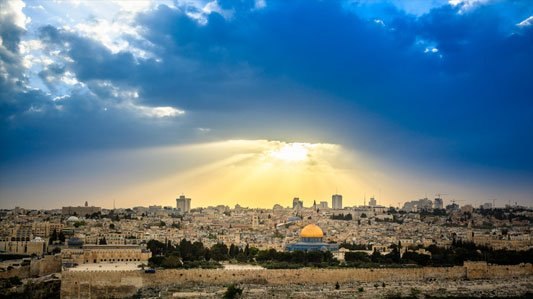Donald Trump has caused an international diplomatic storm – and perhaps much worse - by recognising Jerusalem as Israel’s capital and announcing that the American Embassy will be moved there from Tel Aviv.
Israel, which has claimed the ancient holy city as its capital ever since the state was founded in 1948, was understandably overjoyed. But the Arab world reacted with fury and virtually all of the United States’ western allies, including Britain, responded with alarm. They fear it puts at risk the endlessly drawn-out peace process and that it will provoke widespread violence. President Trump says it could help the peace process. Who’s right?
The United States has been committed to moving its embassy to Jerusalem since Congress passed a motion to that effect back in 1995. But all presidents since then have signed a waiver every six months putting it off for fear the move would jeopardise America’s role as broker of peace talks designed to settle the Israel-Palestinian conflict and establish a two-state solution to it. Donald Trump campaigned for the presidency on a platform of moving the embassy and it is this promise which he now wants to fulfil. But he has gone even further by recognising Jerusalem as Israel’s capital.
When the United Nations passed a resolution in 1947 that led to the creation of Israel it recognised that Jerusalem is revered as a holy city by the three Abrahamic religions of Judaism, Christianity and Islam. So it was left out of the equation or, to be more precise, was defined as a separate entity under international jurisdiction. That was in part because Palestinians intended East Jerusalem to be the capital of their own state once it was set up. This did not stop the new Israeli state declaring that Jerusalem was its own capital and in the 1967 war it occupied the whole of the city as well as large areas of the West Bank. Gradually Israel has established much of the apparatus of the state, including its parliament, its supreme court and most of its government ministries in the city.
In recognising Jerusalem as Israeli’s capital President Trump says he is simply acknowledging the obvious. He said: ‘This is nothing more or less than a recognition of reality’. Israel was overjoyed, claiming it was a ‘dramatic move towards peace’. But Arab leaders said exactly the opposite. The Palestinian president, Mahmoud Abbas, said the move ‘demolished efforts to achieve peace’ and would have ‘dangerous consequences’. His chief representative in Britain, Manuel Hassassian, said of Mr Trump: ‘He is declaring war in the Middle East’. And Hamas, the militant Palestinian group that rules the Gaza Strip, said the decision would ‘open the gates of hell’.
King Abdullah of Jordan said the decision would ‘hamper all efforts to get the peace process moving’ and the Saudi foreign ministry spoke of ‘very serious implications’.
Such responses from then Arab world were predictable, of course. But President Trump’s western allies have been equally unequivocal. Theresa May said: ‘We disagree with the US decision to move its embassy to Jerusalem and to recognise Jerusalem as the Israeli capital. We believe it is unhelpful in terms of prospects for peace in the region.’ President Macron of France called it ‘a regrettable decision France does not approve of’.
What lies behind this western opposition is that it upsets an approach to the Israel- Palestinian conflict which has been backed by successive American administrations and by UN resolutions. Although endless rounds of peace talks have failed to resolve the conflict there has been an international consensus that it be resolved not simply by ‘facts on the ground’ but by negotiation leading to agreement upheld in international law. The talks that most recently got nearest to an agreement, the Oslo round in 1993, had both sides agree that the status of Jerusalem would be part of any final agreement.
Critics of President Trump argue that he has unilaterally given Israel the prize it sought without any quid pro quo for the Palestinians. And in doing so he has destroyed America’s role as the broker who could bring both sides together. The move has been described as ‘an act of diplomatic vandalism’.
But Mr Trump sees it quite differently. He said: ‘After more than two decades of waivers [on moving the embassy from Tel Aviv], we are no closer to a lasting peace agreement between Israel and the Palestinians. It would be folly to assume that repeating the exact same formula would now produce a different or better result. Therefore, I have determined that it is time to officially recognise Jerusalem as the capital of Israel.’
He insists that he is still intent on trying to broker a final agreement between the two sides and has appointed his son-in-law, Jared Kushner, as his envoy to the region. It is known that Mr Kushner has spent a lot of time in discussion with the all-powerful Saudi crown prince, Mohammed bin Salman, and although the Saudis have objected to the President’s move (as the leaders of Sunni Islam they assume responsibility for Jerusalem as the third most important holy city), it is hoped the Saudis will encourage restraint among outraged Palestinians.
Supporters of President Trump’s move believe such hope is not unfounded because they believe the Israel-Palestinian conflict as only one part, and possibly no longer the major part, of the wider Middle East problem. They believe the bigger issue is what they regard as the adventurism of Iran in the region and in this America sees eye-to-eye with Saudi Arabia and many other Arab countries in the region. In short they believe the Saudis, who have been making their own diplomatic advances towards Israel, will swallow America’s change of position on Jerusalem in order to forge an effective alliance against Iran. Some believe that a deal between Israel and the Palestinians could actually be forged through this process.
But others see the exact opposite happening. They think the Palestinians will end up with nothing and that the Israeli annexation of East Jerusalem and of much of the West Bank will, after fifty years of failed negotiations, simply become entrenched as the way things are, with other countries gradually following the American lead and accepting ‘reality’, just as President Trump claims to have done. That, they worry, can only lead to more and more terrorism and violence.
Image Getty











